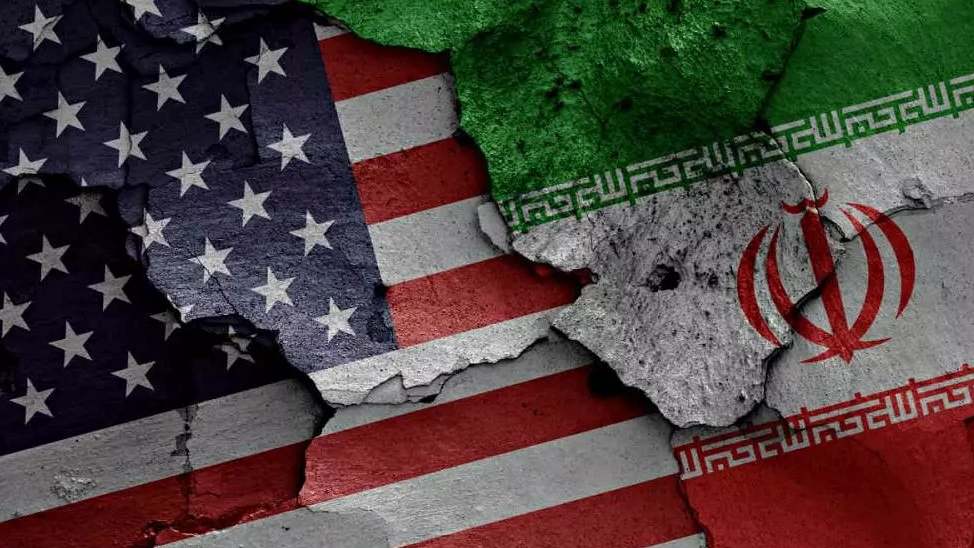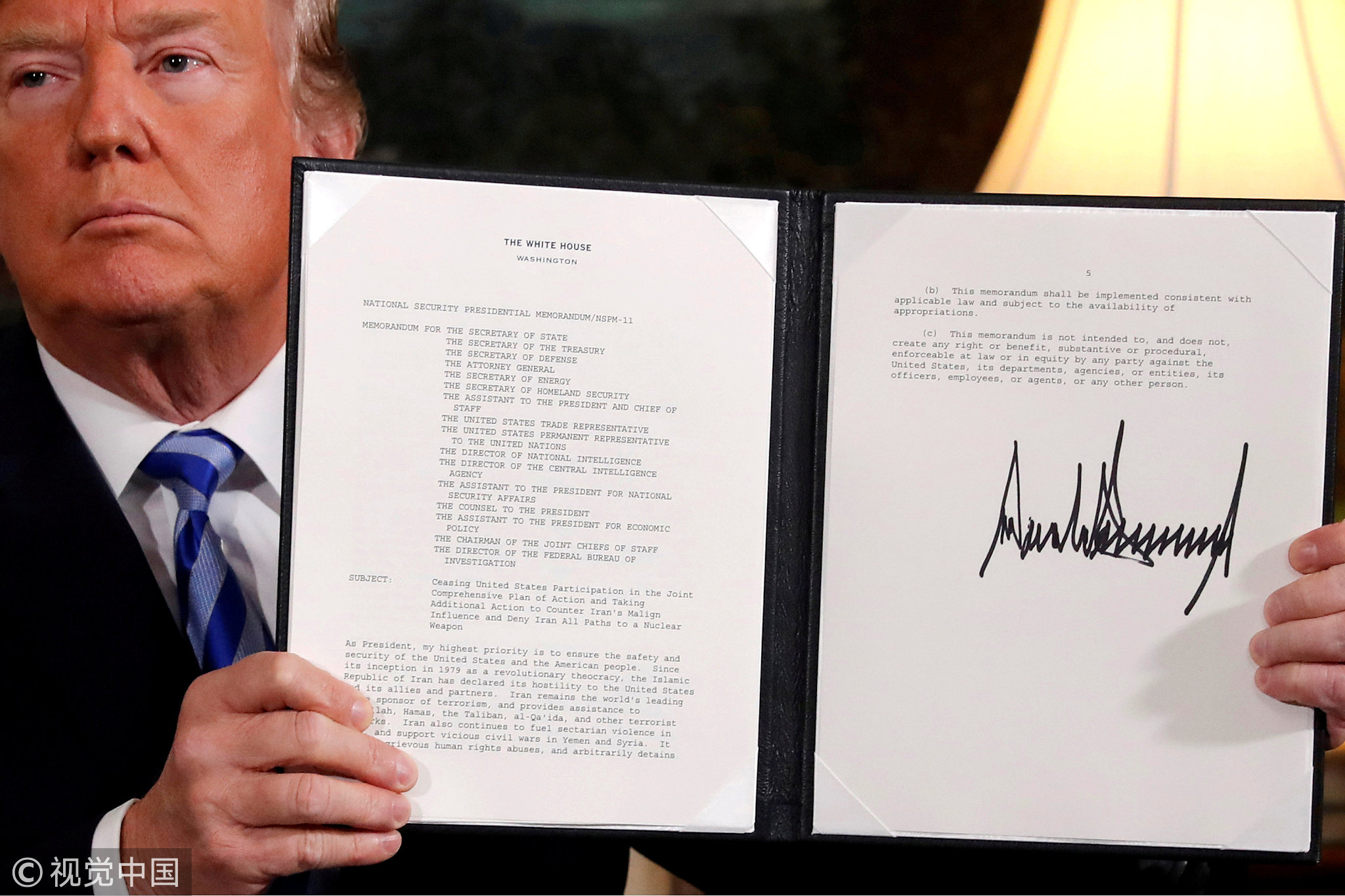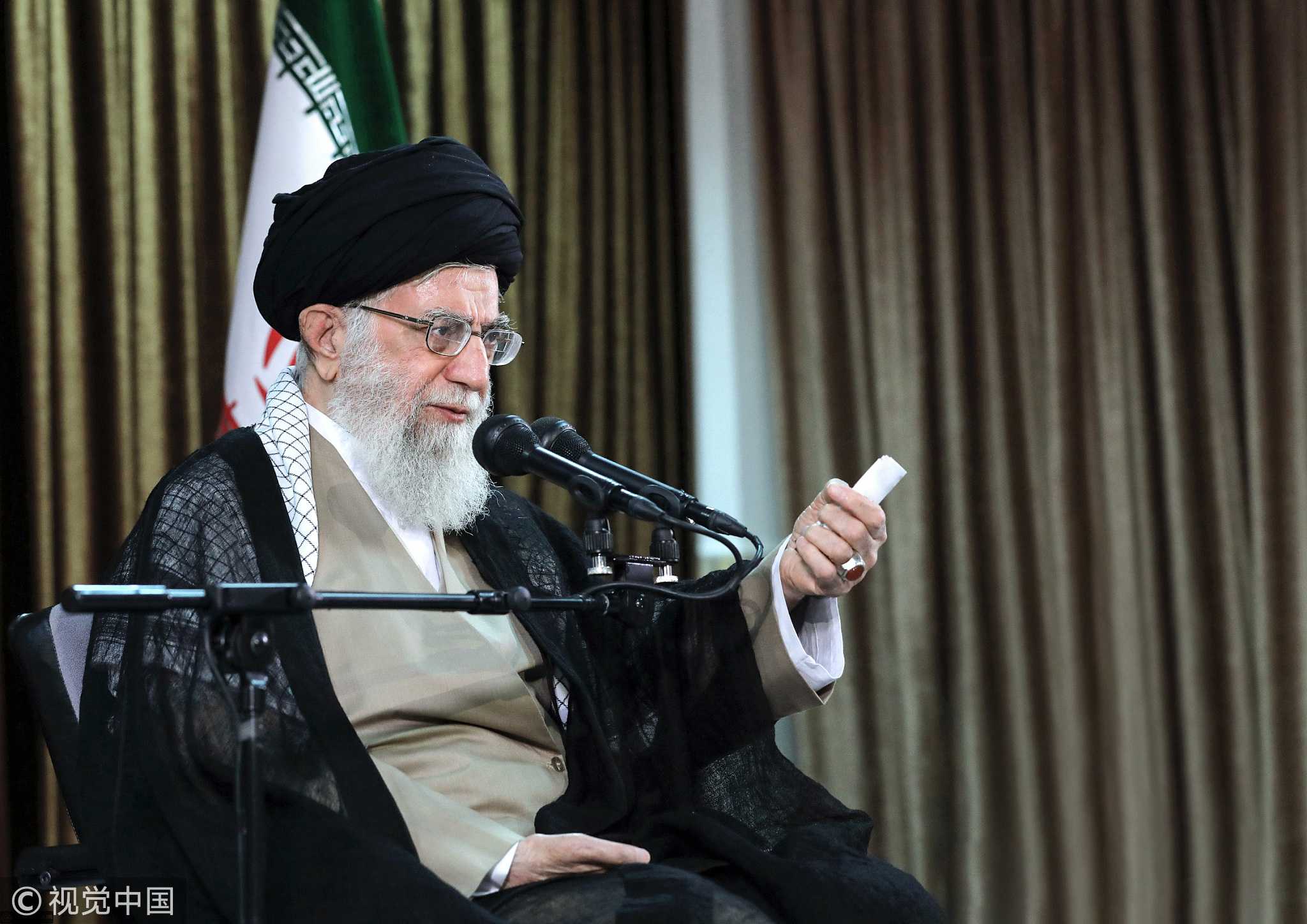
Opinions
12:49, 04-Aug-2018
Opinion: How the US sanctions will influence Iran
Updated
12:32, 07-Aug-2018
Wang Jin

Editor's note: Wang Jin is a research fellow at the Charhar Institute and Syria Research Center of Northwest University in China. The article reflects the author's opinion, and not necessarily the views of CGTN.
As the first batch of Washington’s sanctions against Iran will go into effect on August 6, the relationship between Iran and the US might become a hot-debated topic in international politics. The upcoming sanctions target the acquisition of US banknotes by Iran’s government, Iran’s gold and precious metals trade with other states, the sale and transfer of aluminum, steel, coal, graphite, and Iran’s automotive sector. The second batch of sanctions from Washington to Tehran aiming at Iran’s energy and backing system will come after November 4.

US President Donald Trump holds up a proclamation declaring his intention to withdraw from the JCPOA Iran nuclear agreement after signing it in the Diplomatic Room at the White House in Washington, DC, on May 8, 2018. /VCG Photo
US President Donald Trump holds up a proclamation declaring his intention to withdraw from the JCPOA Iran nuclear agreement after signing it in the Diplomatic Room at the White House in Washington, DC, on May 8, 2018. /VCG Photo
The US sanctions against Iran will significantly influence Iran’s social economy.
Diplomatically, US withdrawal from the Iran nuclear deal, or Joint Comprehensive Plan of Action (JCPOA), signed in 2015, faces strong opposition from not only China, but also European states and Russia. Iran receives support from most major powers beside the US, and Iranians, especially the Iranian government led by President Hassan Rouhani, hope that the world powers will provide enough economic stimulus for Iran to ignore the hardliners’ pressure at home and remain in the nuclear deal.
China has rejected US demand to reduce oil imports from Iran. Given that China is by far the biggest importer of Iranian oil, China’s insistence on importing it might significantly offset Washington’s sanctions against Iran. Meanwhile, Russia also promises to invest more than 50 billion US dollars in the Iranian energy sector, which could significantly increase Russia’s presence and influence in both Iran and the world energy supply market. In addition, both China and European powers are seeking a new financial cooperation channel to settle the business with Iran by RMB or euros to bypass the US dollar. It means that firms from China and Europe might be able to continue their business with Iran.
However, we cannot forget the influence of Washington’s sanctions against Iran. The rial, Iran's national currency, has been in a free fall since Donald Trump decided to withdraw the US from the Iran nuclear deal and re-impose sanctions. According to Iran's official data, 1 US dollar is equal to 45,000 rials. On the black market, the currency exchange between the US dollar and rial has reached 1:100,000. The devaluation of Iranian currency means diminishing spending power, and corrosion of Iranians’ quality of daily life.

A picture provided by the office of Iran's Supreme Leader Ayatollah Ali Khamenei shows him speaking during a meeting with foreign ministry officials in the capital Tehran on Jul 21, 2018. /VCG Photo
A picture provided by the office of Iran's Supreme Leader Ayatollah Ali Khamenei shows him speaking during a meeting with foreign ministry officials in the capital Tehran on Jul 21, 2018. /VCG Photo
Iran's rug-weaving industry, which employs more than 2 million employees, will be decimated due to US sanctions. Meanwhile, sanctions will cause a shortage in some nonessential goods that many Iranians have been accustomed to, such as make-up, some important medicines, fashionable clothes, and the newest electronic products. In addition, US efforts to isolate the rial from the US dollar will put a strain on international tourism, given the difficulty in exchanging the Iranian currency. This may land a vital blow to Iran's tourism industry, which employs thousands within the country.
The increasing economic difficulties faced by many Iranians due to US sanctions might further intensify social and political tension. Many conservatives and hardliners inside Iran are blaming Rouhani's government for being cheated by the US and have threatened to quit the nuclear deal to counter Washington’s upcoming sanctions. For the opposition bloc mainly consisting of conservatives and hardliners, Trump’s decision to withdraw from the nuclear deal provides an important opportunity to re-gain domestic support, challenge the government and even demand its resignation.
Iran’s main goal after the US' withdrawal is to preserve the international consensus for continuing the deal, while attracting investment from Europe, Russia and Asia. The only way forward for both Iran and the US is to go back to the negotiation table and seek a shared solution.

SITEMAP
Copyright © 2018 CGTN. Beijing ICP prepared NO.16065310-3
Copyright © 2018 CGTN. Beijing ICP prepared NO.16065310-3